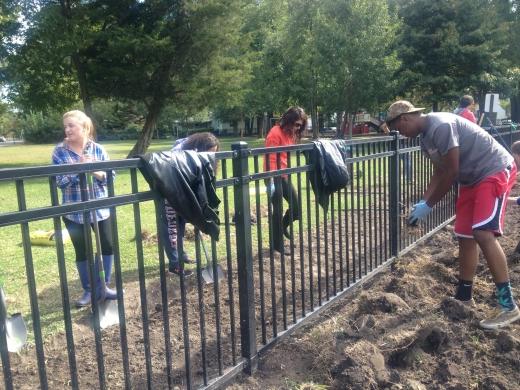Learn by connecting knowledge and action
Experiential learning allows Honors students to enjoy a sense of genuine accomplishment and learn valuable skills in collaboration and project management. It is also a way of reaffirming and clarifying career goals, while enhancing undergraduate portfolios for graduate school or a profession.
Civic Learning Project (HNRS 387)
In their sophomore or junior years, all Perry Honors College students are required to design and complete a 1-credit Civic Learning Project. Although volunteering is often the springboard for developing a civic learning experience, the civic learning project is NOT simply a volunteer experience where you clock in a specified number of hours and you're done. The Honors Civic Learning Project integrates meaningful community service with instruction and reflection to enrich your academic experience, teach civic responsibility, and strengthen communities. The Perry Honors College provides tuition scholarships for full-time students registered for the course.
An Example of Volunteering: You meet with the Dean, and you want to or you have been volunteering to shelve books at a public library. This is a volunteer experience, but it is not the sum total of a civic learning project.
An Example of Civic Learning: You and the Dean draft your proposal for a civic learning project: In addition to shelving books, you speak with the director of the library and learn that the library is the only place where many people in the community have access to a web connection. You also learn that many of the people wishing to use the computers in the library want to create Facebook pages and email accounts so that they can be in contact with their relatives who are living all over the world. You ask what these people know about computers. You're told that they have trouble understanding how to use a mouse. How do you make the computers accessible to this clientele and how do you help these individuals to connect with their families? You interview some of the people wishing to use the computers. You help them one on one. And then you translate those help sessions into screen capture videos. You assess the usability of those videos by observing how they're used, and you create a user survey. Now, you have the makings for a civic learning project.
- It must be approved by the HC Dean. Email your name, major, the name of the host organization, a description of your duties, a description of what you hope to learn from the civic learning experience and the name of your supervisor to perryhonorscollege@xyschool.net. At least forty-five (45) hours of uncompensated activity are required. You are not required to present documentation from the volunteer organization.
Note: It is strongly suggested that you complete all or most of the hours before the course begins. There is to be no "double dipping." You are earning one academic credit for this course, so it should not be in conjunction with some other project you are doing.
- Planning session with the Dean. After you have submitted your description of duties, you will be contacted to set up an appointment to speak with the Dean about how you can translate a volunteer experience into a civic learning project. The basic strategy will be to work from the duties associated with your civic learning experience to create a list of questions that you will answer. You will design a research protocol for answering those questions, as well as a description of the specific products/deliverables associated with the civic learning project.
- Keep a journal starting with the first day of activity. Make an entry about your experiences and observations each day.
- When your project activities are completed, write a two to five-page paper (typed) describing how the organization benefitted from your project and what you have learned in the following areas:
Diversity of Communities and Cultures: Demonstrates evidence of adjustment in own attitudes and beliefs because of working within and learning from diversity of communities and cultures. Promotes others' engagement with diversity.
Analysis of Knowledge: Connects and extends knowledge (facts, theories, etc.) from one's own academic study/field/discipline to civic engagement and to one's own participation in civic life, politics, and government.
Civic Identity and Commitment: Provides evidence of experience in civic engagement activities and describes what she/he has learned about her or himself as it relates to a reinforced and clarified sense of civic identity and continued commitment to public action.
Civic Communication: Tailors communication strategies to effectively express, listen, and adapt to others to establish relationships to further civic action
Civic Action and Reflection: Demonstrates independent experience and shows initiative in team leadership of complex or multiple civic engagement activities, accompanied by reflective insights or analysis about the aims and accomplishments of one's actions.
Civic Contexts/Structures: Demonstrates ability and commitment to collaboratively work across and within community contexts and structures to achieve a civic aim. (source: AAC&U Civic Engagement Rubric)
Your reflection paper, journal, and other supporting documents are placed in your Honors College e-portfolio on the first day of finals week.

Other types of experiential learning
- Study Abroad
- Internships & Cooperative Education
- Teacher Preparation or Practicum



